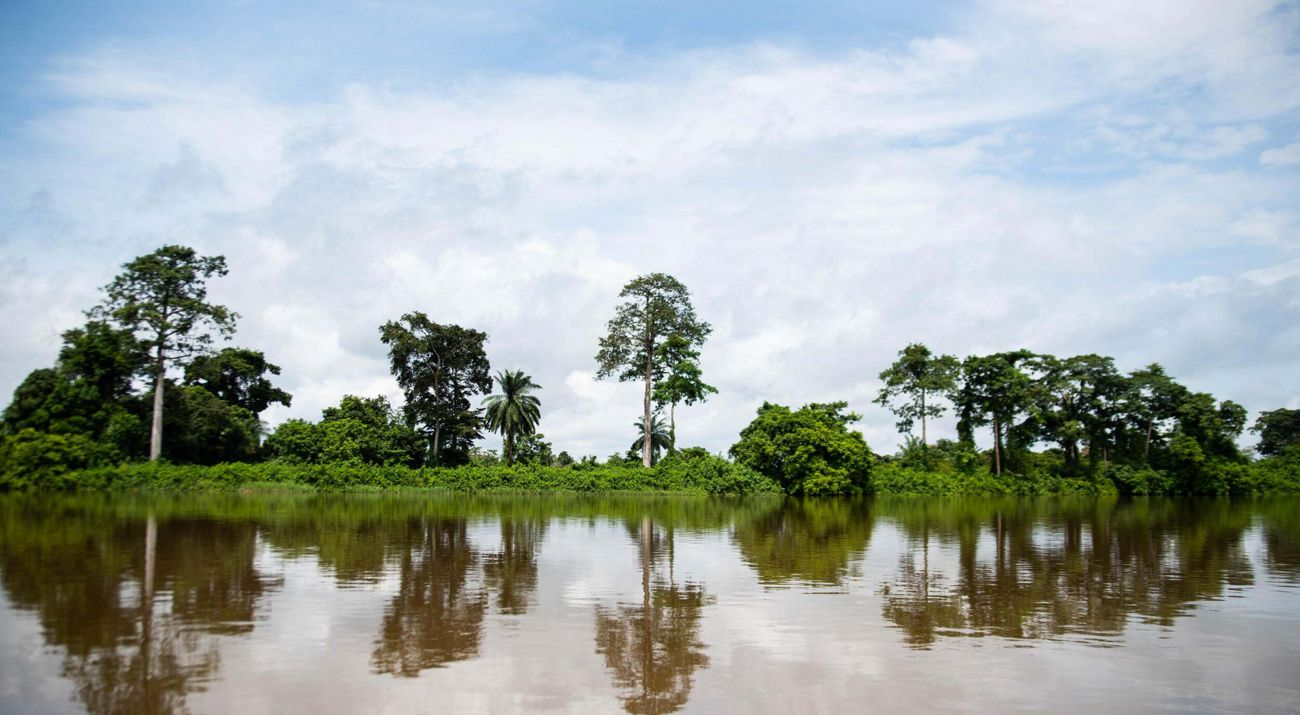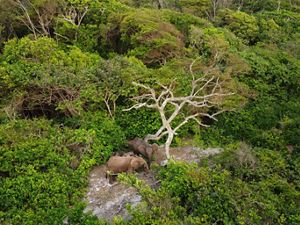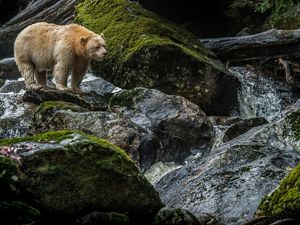US $60 Million Collaboration to Protect Gabon’s Forests and Combat Climate Change
France, Gabon and international partners will work together to advance country’s ambitious conservation goals
Media Contacts
-
Alessandra Clark
Media Relations Manager
The Nature Conservancy
Email: alessandra.clark@TNC.ORG -
Barbara Kuznik
Communications and Marketing Manager
The Nature Conservancy, Europe
Email: barbara.kuznik@tnc.org
Calí, 28 0ctober 2024. At the UN Biodiversity Conference CBD-COP16 in Colombia, France and Gabon today announced a transformative, US $60 million ‘Country Package’ for Forests, Nature, and Climate collaboration that also includes support for the Project Finance for Permanence (PFP).
France, the Fonds d’amorçage des Partenariats Pays, The Nature Conservancy (TNC) representing the Enduring Earth partnership, the Global Environment Facility (GEF), and the United Nations Development Programme (UNDP) will work together to support Gabon’s commitments to forests, nature, and climate via the Global Biodiversity Finance Initiative (BIOFIN).
The countries signed a political declaration to indicate France’s support for the Gabon Project Finance for Permanence (PFP) within the wider country package that was agreed between countries last spring. The country package recognises the importance of Gabon’s unique ecosystems and supports extending protected areas rich in biodiversity and carbon reserves. The initiative is set to advance Gabon’s commitment to conserve 30% of its forests, fresh water, and marine ecosystems by 2030, aligning with its national obligations under the Kunming-Montreal Global Biodiversity Framework and the Paris Agreement.
The Nature Conservancy and Gabon’s agreement to collaborate on a PFP initiative through the Enduring Earth partnership will enable the country to meet its commitment to protecting 30 percent of lands, ocean and fresh water by 2030. Gabon is the first nation to make this triple commitment. The Gabon PFP is expected to protect more than 24,000 square kilometres of forestland, more than 8,000 square kilometres of ocean and 4,800 km of rivers. Improved forest management is expected to contribute the equivalent of 30 million tons of carbon mitigation annually. Building on these conservation commitments, the Gabon PFP will invest in sustainable community development to expand the benefits to Gabon’s communities.
Colonel Maurice Ntossui Allogo, Minister for Water and Forests, Environmental Preservation, Climate and Human-Wildlife Conflict, Gabon: "Today, Gabon reiterated its commitment to protect 30% of its land, freshwater and marine areas by 2030. My country is actively implementing numerous initiatives while ensuring that these efforts contribute to the economic and social development of its people. By giving nature a central role in development, Gabon aims to maintain a balance between preserving biodiversity and improving people's living conditions. That's the aim of the Country Package of Gabon, which outlines our integrated approach to conservation and development."
Agnes Pannier-Runacher, Minister for Ecological Transition, Energy, Climate and Risk Prevention, France: "France, Gabon and their partners have long been committed to fighting deforestation and preserving tropical forests and wetlands. The launch of this new Gabon Country Package at COP16 is an important milestone on the road to COP30 in Belém, enabling the Congo Basin to emerge as a major player in the fight against the ecological and climate crisis".
Jennifer Morris, CEO of The Nature Conservancy and Chair of the Enduring Earth partnership: “PFPs are a proven and effective financial tool for safeguarding lands, oceans, and freshwater as well as tackling the biodiversity and climate crises. Moreover, they lead to direct investment in communities on the ground while fulfilling international commitments. France's support for Gabon’s PFP is a beacon of hope in the global race for a sustainable future, and Enduring Earth is honoured to contribute to this ambitious effort.”
The combination of a Country Package and Enduring Earth PFP are complementary approaches to drive progress toward the Global Biodiversity Framework’s key targets, notably Target 3 (30x30), Target 4 (Halt Species Extinction, Protect Genetic Diversity, and Manage Human-Wildlife Conflicts), Target 8 (Minimize the Impacts of Climate Change on Biodiversity and Build Resilience), Target 19 (resource mobilization), and Target 22 (inclusive and equitable decision-making).
Enduring Earth is a groundbreaking collaboration between The Nature Conservancy, The Pew Charitable Trusts, World Wildlife Fund, and ZOMALAB. Currently, Enduring Earth is working with more than 100 partners, governments, Indigenous peoples and local communities, and funders across 12 PFP projects in 14 countries to durably conserve 390 million hectares of ocean, lands, and freshwater – an area greater than the size of India.
By harnessing the impact of sustainable financing, Enduring Earth is not only working to safeguard 30% of the planet’s lands and waters by 2030, but also ensuring long-term funding for biodiversity and community development initiatives. Additionally, Enduring Earth PFP initiatives foster inclusive governance structures, promoting equity at each step.
The PFP model, through its emphasis on local leadership and collective action, brings together governments, communities and partners to establish sustainable financing that secure durable resources for both, biodiversity conservation and community prosperity.
This approach is underpinned by public-private partnerships, diverse funding streams, and enhanced knowledge and capacity building, all structured within a measurable framework.
With less than six years remaining to achieve the 2030 goals and targets outlined in the Kunming-Montreal Global Biodiversity Framework, the PFP model is emerging as a critical source of durable funding amidst evolving financial and political landscapes.
An initial investment of US $60 million has been committed to kickstart the collaboration. Additional funding and technical assistance are expected as progress is made.
The country package focuses on four key areas to protect Gabon's natural resources. It aims to meet the 30x30 target while also addressing human-wildlife conflicts and strengthening ecosystems against the impacts of climate change. Additionally, the collaboration will foster sustainable forest management by developing green economy value chains, supporting alternative livelihoods, and enhancing Gabon's natural capital. Scientific cooperation is another cornerstone, with efforts to provide grants, build capacity for Gabonese research institutions, and encourage international collaboration and conservation education.
The Nature Conservancy is a global conservation organization dedicated to conserving the lands and waters on which all life depends. Guided by science, we create innovative, on-the-ground solutions to our world’s toughest challenges so that nature and people can thrive together. We are tackling climate change, conserving lands, waters and oceans at an unprecedented scale, providing food and water sustainably and helping make cities more sustainable. The Nature Conservancy is working to make a lasting difference around the world in 81 countries and territories (40 by direct conservation impact and 41 through partners) through a collaborative approach that engages local communities, governments, the private sector, and other partners. To learn more, visit nature.org or follow @nature_press on X.


